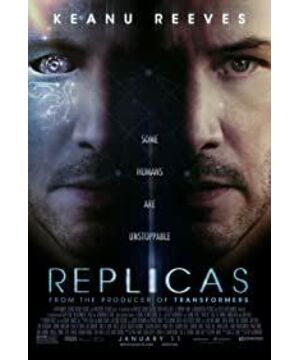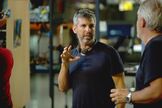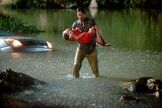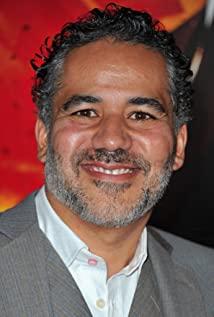Not long ago, the "gene-edited baby" incident caused a public outcry. Can life be chosen? Regarding the exploration of technology and ethics, human beings have never stopped.
Everyone is familiar with genetic programming, and sci-fi movies about human cloning are emerging one after another, from "Moon", "Escape from the Clone Island" to "Clone Husband". Classic sci-fi themes always lead to a lot of thinking. At a time when the hot news of gene editing is raging, the Hollywood sci-fi film "The Clone" starring Keanu Reeves was the first to be released in China, but not yet in North America and Europe. In the movie, there is a protagonist similar to He Jiankui in reality, the mad scientist William, who turned the technology of "human cloning" into reality.
In the author's opinion, "The Clones", compared with previous sci-fi ethics films, has novelties in the plot. The cloned relatives here not only have previous memories, but their memories can also be changed. From the production point of view, "The Clones" cannot compete with the heavyweight blockbusters "Venom", "Aquaman" and "Bean Agent 3" released in the same period, but in general, the discussion and Thinking has value beyond the box office.
"The Clones" mainly tells the story of a sudden car accident that caused the scientist Will to lose his loved ones. It also allowed him to use his work in his spare time to start "cloning" his deceased relatives at home. Unfortunately, there are only three clone warehouses, and Will can only give up his youngest daughter, Zoe, and choose to resurrect his wife and another pair of children. The progress of the matter was as expected, and the nostalgia and love for his relatives allowed Will to successfully resurrect several relatives at home. Although the cloned relatives showed abnormal thinking and behavior in the next step, Will has begun to use everything he has to protect them and keep them.
Looking at most clone movies, "Clone" is not the largest among the sci-fi ethics films that clone relatives, and the early film and television works can be said to refresh the three views in terms of plot. For example, the feature film "Clone Husband" released in 2010 told the story of "I use my husband as my son and my son as my husband". The heroine could not accept the fact that her husband died in a car accident, and used cloning technology to rebuild the Create a husband. Cloning does not require the combination of sperm and eggs, and only needs to put artificial embryos into the uterus to directly develop into individuals, so the hostess uses her own body to create "husband Tommy" and falls in love with this child when Tommy grows up , and had a sexual relationship with him. The most terrifying thing is that the heroine is pregnant with "Tommy"'s child again, and said "this is the last gift my husband left me."
In contrast, "Clone" is not as bloody and destructive as the plot in "Clone Husband", and the plot development is reasonable . In "The Clones", the protagonist William did not call the police immediately when his relatives died. Instead, he found the instrument for gene sequencing and extracted data on the spot, so as to preserve the brain consciousness of his relatives . In the end, the male protagonist successfully cloned his wife and children by transplanting brain nerve data to his relatives and preserved their memories. In the film, Mona woke up, the eldest daughter and son Matthew were alive and kicking, and appeared at the dining table, as usual, excitedly eating breakfast and chatting, except for the youngest daughter Zoe. William deleted all the neurological data about Zoe in their minds, cleaned all Zoe's belongings, and pretended that there was no such person.
At this moment, the conflict of movies throws out an ethical challenge: Does the cloned copy have the right to demand that the memory not be tampered with? And if the process of "copying" allows human manipulation and modification, then the dominance of "copying" is exactly where In the hands of the manipulator or the body of the cloned person.
The sign of life cannot be easily erased. Mona remembers a photo hanging on the stairs, but it's gone now; the eldest daughter asks William, "There's a bunk bed in the house, why is it gone?"
They felt strange and strange, especially Mona, who often frowned. Finally, faced with doubts, William confessed to Mona. "Mona" and "Children" are both clones. At this moment, "clones" are facing a huge crisis of identity.
But unfortunately, after throwing out the ethical dilemma at the front, the film adopts the best way of avoiding the important in commercial films, leading the main narrative line of the film to the positive side represented by Will and his family and the opposite side represented by the laboratory boss In the midst of a power struggle over human replication technology . Will's family recognized the identity of the replicators almost without any painful thinking. As for the design of the film's ending, for this type of theme, it was unexpectedly happy : Will and the laboratory owner A compromise was reached and a machine scientist was reproduced with his own consciousness to continue to guide the development of the laboratory project; in return, the laboratory also provided help to Will, so that the youngest daughter could be copied and "reborn", and the family has been living together since then. Away from the hustle and bustle of the sea to achieve family reunion and retreat.
Speaking of starring, I have to say that Keanu Reeves as the male protagonist has attracted a large number of Chinese audiences for the film. His acting skills are not only consummate, but his life experience is also easy for the audience to associate. He made a name for himself with the "Matrix" series of films, and after a few years of silence, he re-emerged in Hollywood with films such as "Fast Pursuit" and "Fast Attack", and finally returned to the mainland to introduce the film market. In addition to his works, his life experience is also extraordinary. His biological father divorced his mother when he was two years old, he was imprisoned for drug dealing as a child, his best friend River Phoenix died of a drug overdose in 1993, and his only girlfriend Jennifer Simon died in 1999 gave birth to their daughter in Seventy were donated to the hospital for the treatment of leukemia, and he often read Buddhist scriptures on the set when filming "The Matrix 3".
Because of the difficulties of Keanu Reeves in real life, the audience guessed that the happy ending of "The Clones" was to fulfill his dream. There were not too many turbulent plot axes. It is a kind of comfort, so even though there is a plot about the exchange of fire between the pros and cons in "The Clones", it is never used as a publicity stunt, but instead focuses on the tangled attitude of "resurrection of true love" , so that the film explores The theme goes beyond the suspenseful crime and enters the ethical level.
In general, cloning technology and genetic modification have always been sensitive topics at the moment. Modern cloning technology has been advancing, from cloning Dolly the sheep, cloning monkeys, cloning artificial ears, and even the gene-edited babies. Technology is closely followed, and technology and ethical exploration complement each other. In "The Cloning", we can see a bright prospect for the "resurrection of true love" by cloning technology, but the discussion on ethics is still relatively simple, and the market still needs a film that truly explores genetic modification and human relations dilemma.
View more about Replicas reviews











